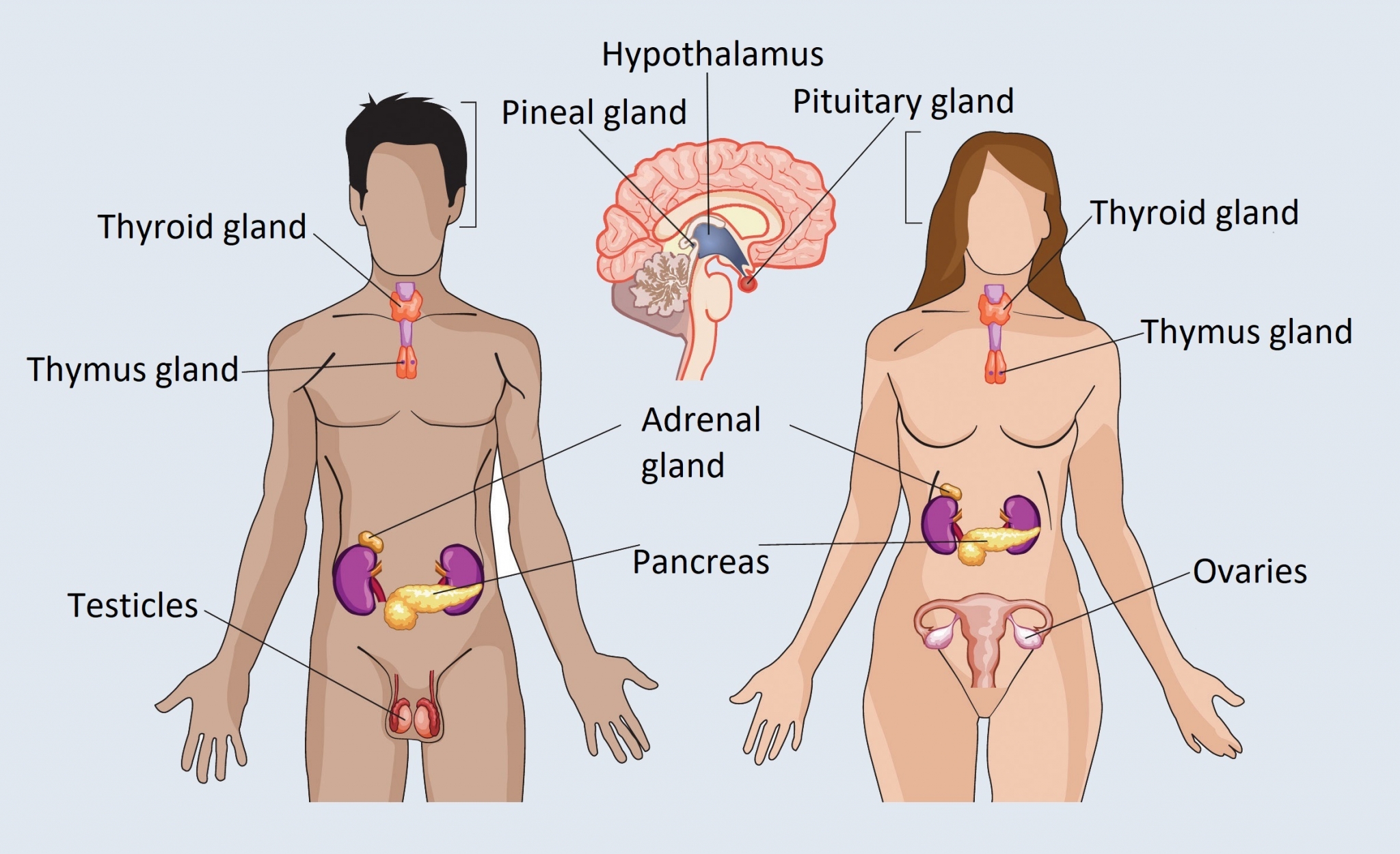Endocrinology
Endocrinology deals with hormone-related diseases, and it is a specialty of internal medicine and paediatrics that deals with the diseases of the endocrine glands, primarily the thyroid, parathyroid, adrenal, pituitary, ovaries, testicles, and pancreas. The endocrinologist can recognize and cure hormonal problems and their consequences.
Why should we see an endocrinologist?
You may have previously been diagnosed with a hormonal disease or your GP may suspect hormonal disease. You may also have a suspicion of hormonal disease based on your complaints.
It is the task of the endocrinologist to confirm or clarify the diagnosis, to detect any related medical conditions, and to establish an examinational and therapeutic plan. They can interpret the results of each diagnostic test (blood samples, ultrasound, scintigraphy, CT or MRI, histological examination, etc.) in a complex way, know the most modern therapeutic options and can choose the most suitable one for you.
The endocrinologist may also be able to offer a solution even when standard therapies do not give the expected results. The endocrinologist works with many other specialists, gynaecologists, otolaryngologists, dermatologists, urologists, ophthalmologists, dieticians, general practitioners, or paediatricians if needed.
If you also use the services of the associate specialities in our Institution, your treating physicians have the opportunity to discuss your case in person, so we can analyse your problems in a complex, multi-faceted, efficient way and find the optimal solution.
What complaints can indicate a hormonal problem?
Complaints related to the hormonal system are often very general and difficult to grasp (e.g. fatigue, poor sleep). However, if these problems persist or worsen over time, it is definitely worth seeking a medical opinion. The endocrinologist can decide if it is worth looking for a hormonal, lifestyle, or other reason behind the specific complaints.

- fatigue, even after 8-10 hours of sleep
- night insomnia
- drastic, sudden weight changes, unreasonable weight gain or loss
- mood swings, panic, depression, nervousness, palpitations
- constipation
- diarrhoea, irritable bowel syndrome symptoms
- hair and skin problems, hair loss, acne, pigmented or dark spots on the skin
- menstrual disorders, fertility problems
- impotence
- increased hair growth in ladies
- sudden increase in thirst and urination, also at night
- slow or unreasonably fast growth of children
- delayed or premature adolescence
How can the hormonal system deteriorate?
When it comes to the diseases of the hormonal system, the function of individual hormones is not adapted to the needs of the body, i.e. insufficiency (too little hormone) or overactivity (too much hormone) is formed. It is also possible that a previously well-functioning hormone loses its effectiveness due to something, an increasing amount must be produced in order to reach the desired biological effect (resistance or insensitivity). Benign and malignant tumours can also develop in the hormonal glands, causing the gland to enlarge, possibly with a palpable lump.
Congenital diseases of the hormonal system usually cause complex, characteristic symptoms, the recognition and treatment of which is the joint task of the paediatrician and the paediatric endocrinologist.

What does the endocrinologist do?
The endocrinologist deals with the body’s hormonal disorders and their curing. They aim to restore the tilted balance in the body, optimizing the functioning of sick endocrine glands. Hormonal diseases that endocrinology deals with:
- hypothyroidism
- hyperthyroidism
- Thyroid diseases associated with pregnancy and post-partum
- nodular goitre (enlargement of the thyroid gland)
- ovarian dysfunction
- hormonal disorders of male sexual function (impotence)
- pituitary dysfunction (hypophysis)
- water disturbance
- growth disorder
- examination of the function of the adrenal cortex and medulla
- high blood pressure disease
- exploring possible hormonal causes of obesity
- examination of the parathyroid gland
- recurrent kidney stones
- exploring the hormonal causes of osteoporosis
- treatment of cancer of the endocrine glands
- endocrine care after oncology treatment
- hormonal abnormalities associated with critical age
What happens during an endocrinological examination?
At the endocrinology clinic, the patient’s complaints are first thoroughly explored, and then the doctor requests a laboratory examination and often an ultrasound as well, specifying the hormones to be tested. During the subsequent evaluation of the results, additional specialist examinations will be ordered if necessary. In this case, our internists, radiologists, otolaryngologists, ophthalmologists, dermatologists, urologists and gynaecologists are available to our patients.
How should I prepare for an endocrinological examination?
It is in the common interest of the endocrinologist and the patient to get as accurate information as possible about your problem as soon as possible. Therefore, before the endocrinological examination, it is important to summarize and possibly write down your complaints and observations. It is important that you can accurately list the medications you have previously taken. Previous hospital final reports, laboratory results, ultrasound or histological examinations may be important in assessing the time course of complaints, please bring them with you if you can! When examining children, the Health Records, or any previous developmental data (weight, height) requested from the school physician, may provide important information about the child’s development.
What kind of endocrinological tests are available?

Laboratory tests
The endocrinologist’s “main weapon” is measuring hormone levels. Since our hormones reflect the changing needs of the body, often within quite wide limits, it is essential for accurate results that blood is drawn at the right time and in the right way: hormones that show daily fluctuations, the time of blood count happens usually early in the morning, for female hormones the day of the blood draw depends on the menstruation cycle, and when it comes to testing for carbohydrate metabolism, having an empty stomach is a must.
Hormone results often should not to be evaluated on their own, but in comparison with other hormones, so it is important not to rely solely on the laboratory results, but also to be evaluated by a skilled professional who can interpret the findings in context.
During the endocrinology test, your endocrinologist will most likely order various hormone measurements. However, if you have previously been diagnosed with a hormonal disease or suspect one of the hormonal systems, you can choose from our endocrine blood count packs before the specialist examination, so the endocrinologist can get an idea of the condition of the hormonal system on your first visit and can make a more accurate diagnosis.
Ultrasound
Ultrasound is a gentle, painless procedure that is perfect for detecting internal medical, endocrinological, urological, articular, gynaecological and vascular problems. Using the ultrasound, our endocrinologists can infer from the structure of the thyroid gland (nodular nature), the detection of inflammation and the possible presence of tumours. If necessary, thyroid biopsy is also performed using ultrasound. The procedure is no more painful than the feeling of a tiny needle prick when a tissue sample is taken. The histological specimen is evaluated by highly experienced pathologists based on the scoring systems of international recommendations. The structure of the ovaries and testicles can be examined with ultrasound, and in some cases abdominal ultrasound can also be informative.
Advanced diagnostics
The adrenal glands are often not or not accurately seen on ultrasound, and the most accurate picture of the structure of the adrenal glands can be obtained by CT or MRI. In case of the diseases of the pituitary gland, it is important to know the structure of the gland, this can be achieved by contrast-enhanced MRI. Recent kidney function blood counts are required before contrast tests! At our advanced Diagnostic Center, we perform the examinations with the most modern CT and MRI machines, the findings are evaluated by our experienced radiologists.
What are the treatment options for endocrinological problems?
Most endocrine diseases can be treated with medication and/or diet. In some cases, surgery or isotope treatment may be needed. At our private clinic in Budapest, our Diagnostic Center is at the disposal of our patients with the latest technology. Most of the examinations and interventions can be performed in our institution, and we try to help organize additional care.

